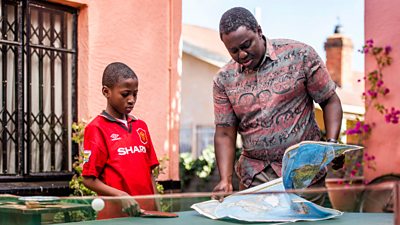Interview with Babou Ceesay (Richard Taylor)
Gripping, feature-length drama that tells the true story of the family of Damilola Taylor, going beyond the headlines to reveal a surprising and affecting portrait of family, fatherhood, loss and love.

It’s very hard to hold back thinking of my daughter in that situation. I spent five days away alone where I thought about Damilola all the time, and tried to understand who he was and see his face in my mind.
Do you remember the news when it broke back in 2000?
Yes, I was in London, studying microbiology at Imperial College. I’d moved to London two years earlier. When I found out where Damilola was from and his age, as a fellow African it really resonated with me and brought me back to thinking about a time when I first moved to England. I thought, I wonder what it must have been like for Damilola being an outsider, coming from privilege, which I did as well, and being threatened.
I followed the story for about a month. It came up a lot in conversation. I think the thing that was different was that I felt sorry for him as an African who had come here for his family. Later on, my wife started working for the Jimmy Mizen Foundation; it has come full circle with Damilola, Our Loved Boy.
Why did you want to take on the role of Richard Taylor?
It was spiritual for me, honestly. I know that sounds crazy but from the moment I heard about it and read it, I felt like no one else was going to me do it but me. Once I read it, I felt this great weight of responsibility also coupled with a strong desire to tell the story.
What did you find most challenging about the role?
Keeping my tears in! That’s what I found hard, having scenes where Richard as a man would have dealt with it in a much more stoic way than me as a man would. I would have been a mess and not able to control my emotions. It’s very hard to hold back thinking of my daughter in that situation. I spent five days away alone where I thought about Damilola all the time, and tried to understand who he was and see his face in my mind.
How was it working with the rest of the cast?
Sammy is touched with something incredible. One of the things about the film is that when you’re watching it, you don’t want to sit there thinking where this poor child is headed. I felt watching it that I was just too engrossed in watching Damilola as a kid to think about his fate. I think that’s incredible and I can’t imagine anyone but Sammy being able to do that.
Juwon and I developed a really strong kind of father-son relationship and still have it. It’s an incredibly talented cast but I want to talk especially about Wunmi. I just needed to look at Wunmi in a scene and I’d know where we are. She’s gifted. We really became a family and still are.
What do you think Levi has brought to the story?
Levi for me brought something which I don’t think has quite been seen on British TV yet, which is the African dad. Everyone will relate to Richard Taylor in a ‘dad’ way but there are specific things which make for an African dad, like the scene where Tunde’s school report is shown and his reaction is to go “oh, okay”. I know living rooms where Africans will be sitting and they’ll start laughing. They’ll laugh and laugh because they know they have seen that exact same reaction. I remember bringing home second place in my class and they said “ah, it’s not first though.” And you’re sitting there thinking, wow, I’ve just got to try harder. I look back at it and thank the lord for it because it’s given me a push.
What Levi has done is distilled it down to the relationships. The fact that we don’t see too much about the trial and the police, in terms of the work they were doing, or the fact that he wasn’t attempting to politicize it. All he’s done is made it relatable to anyone who’s got a family. You can’t help but get drawn into it.
Why do you think it’s important that we revisit the story of the Taylor?
First of all that statistic of the 204 children losing their lives since then. I think there’s a moment right now, in history, where we’re questioning a lot of things about ourselves. How we treat women, how we treat the different races of the world – and I mean everybody – and although the story’s not politicized, it just feels like a time when whoever gets to see this, their eyes might be more open to trying to understand different experiences. What does an African family experience when they’re trying to come to a society like this? Why do people come? It’s a moment to look at people in this environment in a different way.
What would you like the audience to take away from watching it?
If at the end of watching the film, anyone has felt in those 90 minutes that they’ve gone on some semblance of the Taylor’s journey and they can relate to it, in an ideal world it would lead to change. For someone to be affected enough to want to do something different in their lives, or go out there and support someone, that would be amazing.
